Quinney Guides d'étude, Notes de cours & Résumés
Vous recherchez les meilleurs guides d'étude, notes d'étude et résumés sur Quinney ? Sur cette page, vous trouverez 22 documents pour vous aider à réviser pour Quinney.
All 22 résultats
Trier par

-
Theoretische criminologie: overzicht en samenvatting theorieën
- Resume • 115 pages • 2023
-
- €6,99
- 2x vendu
- + en savoir plus
Alle theorieën die bij theoretische criminologie aan de orde zijn gekomen staan systematisch geordend en samengevat. Per theorie of benadering staan de kenmerken, voor- en nadelen, verklaringsniveau, mensbeeld en beleid beschreven. Ook eventuele verschillen en overeenkomsten met de andere theorieën zijn erin meegenomen. Een overzicht van de theorieën die erin staan: 1. Biologische benaderingen Erfelijkheid – genetica Neurowetenschappelijke verklaringen (neurochemie, neurofysiologie e...

-
wcc: chapter 11 Questions and Answers 2023
- Examen • 5 pages • 2023
-
Disponible en pack
-
- €18,51
- + en savoir plus
wcc: chapter 11 Questions and Answers 2023 case of the day barry minkow ZZZZ: best cleaning restoration company; in reality ponzi like scheme with 90% of company being fraud (insurance fraud, steal their stationary, create fake jobs, etc). 1981: came crashing down since numbers didn't add up. resigned at 22 and in 1988 was charged with 57 counts of fraud and 25 years in prison, 26 million. released after 2 years and became preacher and fraud investigator. 2011: brought down stock price delibe...
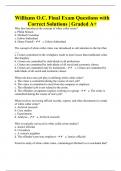
-
Williams O.C. Final Exam Questions with Correct Solutions | Graded A+
- Examen • 30 pages • 2023
-
- €8,54
- + en savoir plus
Who first introduced the concept of white collar crime? a. Philip Stinson b. Michael Cosentino c. Edwin Sutherland d. Henry Pontell - c. Edwin Sutherland The concept of white collar crime was introduced to call attention to the fact that ___ a. Crimes committed in the workplace result in more losses than traditional crime like burglary b. Crimes are committed by individuals in all professions c. Crimes are committed by individuals of all social and economic classes d. Crimes are co...
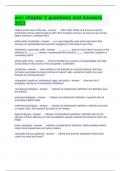
-
wcc chapter 2 questions and answers 2023
- Examen • 3 pages • 2023
-
Disponible en pack
-
- €9,96
- + en savoir plus
wcc chapter 2 questions and answers 2023 charles ponzi case of the day 1882-1949. father of the ponzi scheme. embezzled money (paid investors with other investors money). as long as new money keeps coming in, constant influx white-collar criminaloid e.a. ross originally used what expression that focused on respectable businessmen engaging in misconduct and crime sutherland. upperclass. elite _________ built on ross's idea. focused on the behavior of ________ citizens. emphasiz...
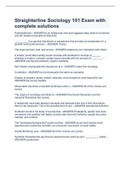
-
Straighterline Sociology 101 Exam with complete solutions
- Examen • 6 pages • 2022
-
- €9,49
- + en savoir plus
Postmodernism - ANSWER-is an intellectual view that suggests deep distrust of science and the research principle of objectivity __________ is a general framework or perspective that provides an explanation for a specific social phenomenon. - ANSWER-Theory The ways we think, feel, and act are - ANSWER-shaped by our interaction with others A simple, small tribal society would coincide with Durkheim's concept of ______, whereas a modern, complex society would coincide with his concept of ...
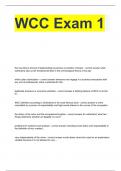
-
WCC Exam 1 with correct answers 100% 2023/2024
- Examen • 14 pages • 2023
-
- €12,62
- + en savoir plus
WCC Exam 1 Edwin Sutherland - correct answer Who coined the term White Collar Crime? white collar crime - correct answer a crime committed by a person of respectability and high social status in the course of his occupation (Sutherland) businessman - correct answer What is the profile for a likely perpetrator of WCC? - general self-report surveys of the public and in specific occupations - gain the trust of victims - correct answer how to overcome the challenges of condu...
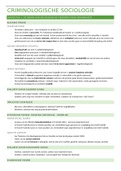
-
Samenvatting Criminologische Sociologie (GESLAAGD)
- Resume • 9 pages • 2023
- Disponible en pack
-
- €9,99
- + en savoir plus
Beknopte samenvatting van het vak criminologische sociologie, goede basis voor het examen.
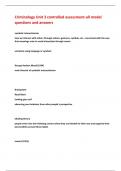
-
Criminology Unit 3 controlled assessment-all model questions and answers
- Examen • 18 pages • 2024
-
- €14,71
- + en savoir plus
Criminology Unit 3 controlled assessment-all model questions and answers symbolic interactionism how we interact with others through actions, gestures, symbols, etc.; concerned with the way that meanings arise in social interaction through comm unication using language or symbols George Herbert Mead (1934) main theorist of symbolic interactionism Brainpower Read More looking glass self observing your behavior from other people's perspective labeling theory people enter into law-v...

-
CMY1501 EXAM PACK 2020.
- Examen • 158 pages • 2021
-
- €3,50
- 1x vendu
- + en savoir plus
CMY1501 EXAM PACK 2020. CMY1501 Introduction To Criminology. Which one of the following is not an assumption made by the classical school? (a) All people are by their nature self-seeking and therefor liable to commit crime (b) In order to live in harmony, people agree to give up certain freedoms in order to be protected by a strong central state (c) Punishment is necessary to deter crime and the state has the prerogative to administer it (d) Punishment should be proportionate to the crime (...

-
CMY1501 Summary of notes - perfect for exam revision!
- Autre • 193 pages • 2023
-
- €5,51
- + en savoir plus
Classical: People have free will to choose criminal or conventional behaviours. People choose to commit crime for reasons of greed or personal need. Crime can be controlled only by the fear of criminal sanctions. Founders: Beccaria and Bentham. Juridical. People are motivated by hedonism and to minimise pain. Punishment should fit the crime, not the criminal, and take place publicly as soon as possible after the crime. All persons should be treated equally before the law. Focus is on the act (cr...



